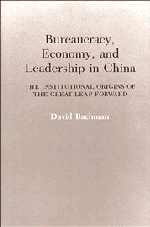Book contents
- Frontmatter
- Contents
- Preface
- Acknowledgments
- Chronology
- 1 Introduction
- Part I Historical background and conceptual approach
- Part II The institutional origins of the Great Leap Forward
- 4 The financial coalition
- 5 The planning and heavy industry coalition
- 6 The Party as agent of social transformation
- 7 The views of the top leadership
- 8 The Third Plenum of the Eighth Central Committee and the Great Leap Forward
- 9 Conclusions
- Appendix: The constraints on Mao
- Bibliography
- Index
7 - The views of the top leadership
Published online by Cambridge University Press: 21 March 2010
- Frontmatter
- Contents
- Preface
- Acknowledgments
- Chronology
- 1 Introduction
- Part I Historical background and conceptual approach
- Part II The institutional origins of the Great Leap Forward
- 4 The financial coalition
- 5 The planning and heavy industry coalition
- 6 The Party as agent of social transformation
- 7 The views of the top leadership
- 8 The Third Plenum of the Eighth Central Committee and the Great Leap Forward
- 9 Conclusions
- Appendix: The constraints on Mao
- Bibliography
- Index
Summary
The ultimate power of decision in China in the mid 1950s lay in the hands of the half-dozen members of the Politburo Standing Committee, which, as determined at the Eighth Party Congress in September 1956, was composed of Mao Zedong, Liu Shaoqi, Zhou Enlai, Zhu De, Chen Yun, and Deng Xiaoping. Among these six leaders, Mao's position was supreme. He was not just first among equals; his power and position in the political system were unparalleled. He had unique ideological, experiential, and charismatic sources of authority. His political skills far surpassed those of his colleagues on the Standing Committee, and his determination to have his way was implacable.
That Mao had these sources of power, however, does not mean he necessarily chose to use them. In the mid 1950s, he was relatively open to the ideas and suggestions of others. He had some sense of his own limitations and lack of knowledge, and he delegated authority to others to implement, and at times initiate, policy. Other Chinese leaders saw Mao's strength as his ability to set the major direction for policy, to formulate overall priorities, to identify and present general guidelines for solving the “principal contradiction.” He was a “big-ideas man,” not a master of details. His own ideology was undergoing change in the mid 1950s, and his views were not entirely consistent. He usually adhered to a collective, consultative style of decision making.
- Type
- Chapter
- Information
- Bureaucracy, Economy, and Leadership in ChinaThe Institutional Origins of the Great Leap Forward, pp. 157 - 190Publisher: Cambridge University PressPrint publication year: 1991



